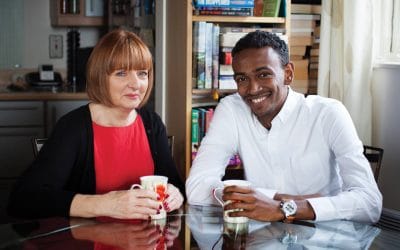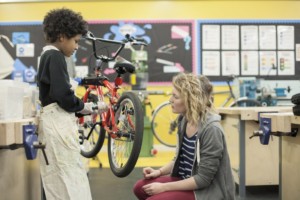RAGFP Leader Champions Integration for Refugees in the United Kingdom

Alison Sutherland is a Rotarian peacebuilder and serves on the Board of Rotarian Action Group For Peace (RAGFP). She is the current chair of our Peace Education Committee and her personal commitment to peace exemplifies our mission to educate, engage and empower Rotarian peacebuilders around the world.
Alison is a tireless Rotarian peacebuilder who always seeks an opportunity for service above self. This story, originally published in The Rotarian Magazine UK, in her own words, represents an inspiring account of how “service above self” is a lifestyle for Rotarian peacebuilders.
Seeking Shelter
By Alison Sutherland, December 2017, Published in Rotary International
“Quite often I drive along the stop-start Newport Road in Cardiff to visit my daughter. Two years ago, I remember noticing a fair-sized group of men sitting outside a fairly non-descript building. They were just chatting.
When I got to work, I decided to find out what the building was used for and discovered it was a resettlement centre for refugees and asylum seekers. At the time I thought how sad it was to see these people just hanging around on a busy road-side, waiting for their cases to be researched and presented.
I decided something needed to be done, so I met John Kerry, manager of the resettlement centre, known as Lynx House. He agreed that I could visit the centre every Sunday to deliver a programme to these people on behalf of Rotary District 1150 (Southern Wales).
The programme is provided by PeaceJam, a US charity. It has the support and input from 13 Nobel Peace Laureates, including the Dalai Lama, the retired Archbishop Desmond Tutu, Oscar Arias, the former president of Costa Rica, and Iranian human rights lawyer, Shirin Ebadi.
Wales is home to several thousand displaced people from Eritrea, Libya, Syria, Iraq, Iran, Uganda and other countries. When they arrive in the UK seeking asylum, they have to wait for up to a year for a hearing to determine if they qualify for official refugee status. We get up to 1,000 a month seeking refuge in Cardiff.
Life during that time is extremely frustrating for them. They’re not allowed to work. Meanwhile, of course, they are very afraid. Their journeys have been horrendous.
Because of the diverse backgrounds, nationalities and languages of the residents, it’s only possible to deliver a two-hour chunk. Arabic is the major language, but often, the sessions are delivered in up to 10 languages with residents translating for each another. Sometimes, though, this is not always possible.
The programme looks at the Laureates and touches on some of their stories, highlighting their lives and how they handled conflict in a peaceful way. It illustrates how the Laureates also had to flee their home countries in fear of their lives. And the programme deals with identity and difference, universal human rights, plus the culture and traditions of the UK, specifically Wales.
The point of the programme is to equip these would-be citizens to integrate quickly into their new communities. It helps them to hold on to who they are while, at the same time, understanding and embracing the differences. We want to set them up for integration, rather than isolation.
I take the attitude that we’re not looking at the root cause, we’re looking at the presenting issue. They’re here, and we need to help them. During the first year, 16 residents of Lynx joined Rotaract. They attended social events and volunteered alongside City of Cardiff Rotaract and Cardiff Bay Rotary.
They shook tins, stewarded at the big firework event at Cardiff Castle, face-painted, dressed up as Christmas Elves in support of a local children’s hospice and got involved with street cleaning and a blood pressure event.
These residents did not always fall within the prescribed Rotaract age range, but it was not possible to offer them Rotary membership as they were not in possession of their citizenship, plus the costs were also prohibitive. However, the Rotaractors decided that they wanted to support and subsidise them.
The background of the residents of Lynx varies considerably. There was an international human rights lawyer from Libya, a surgeon from Syria, a petro chemical engineer from Sudan and so on.
What we are doing in Cardiff is making a small, but significant difference. The programme runs every other Sunday where I am assisted by two City of Cardiff Rotaractors, one of whom acts as an Arabic translator.
Each of the recipients, especially those who joined Rotaract, have said that they felt this programme is vital. They said that no one else is giving them this information. They believe the friendship, welcome and respect which they received has helped them enormously.
I’m passionate about justice. I’m passionate about being the voice of the voiceless. I think everyone is entitled to human rights and to opportunities and that some wrong turns don’t define the rest of their life.
One of the residents told me how the programme had prevented him from committing suicide. And that, perhaps, is the most sobering thought of all.” Read the Original Article Here

Alison Sutherland is a RAGFP Board Member and Current Chair of the RAGFP Peace Education Committee.
Alison further facilitated refugee integration in Wales by helping form a link with the Welsh Refugee Council in her home city of Cardiff. Refugees and asylum seekers who desire to integrate into the local community are now referred to the City of Cardiff Rotaract. This is Rotarian peacebuilding because Rotarians are filling a need for community involvement and assimilation of refugees, even as many Western Democracies in our world struggle to adapt to this modern humanitarian crisis. As Alison said in her article for The Rotarian Magazine, “These residents did not always fall within the prescribed Rotaract age range,” but Rotarians recognized their human rights and created spaces within Rotary to assist them.
Her Rotary District 1150 also forged partnerships with other organizations in the country to assist refugees and asylum seekers who arrive in the United Kingdom. Rotarians work with Oasis to provide English classes, sports and craft facilities, community social events and even help with complicated government form fillings. The partnership between Peacejam / Rotary District 1150 helps train staff and oversees an ongoing delivery of the Peacejam Ambassadors Curriculum.
The Peacejam/Rotary District 1150 partnership offers courses for refugees. One is a short course of about two hours (detailing much of the information they receive in local Resettlement Centers), and a more detailed course providing them skills and tools that can help them assimilate in a new environment. Often in classrooms provided by the Oasis organization.
All participants are invited to join the City of Cardiff Rotaract.
These Rotarian partnerships facilitate Building a Stronger Britain Together. A community of organizations in the UK who recognize the need for public/private partnerships to help integrate all peaceful refugees who arrive on their shores.

In our October 2018 RAGFP newsletter, Rotarians Unify for Peace, we also shared how a RAGFP Peacebuilder Club, the Rotary Club of Bornheim, is utilizing RI global and district grants to integrate many of the 10 million refugees in Germany. RAGFP members and Peacebuilder Clubs are on the leading edge of dealing with a modern refugee crisis throughout Western Europe. Rotarian peacebuilders offer solutions in conflict resolution and peacebuilding based in the Universal Declaration of Human Rights, even if/when wider society either ignores or contracts from “others,” because Rotarians are champions of human rights.
RAGFP Board Member Alison Sutherland offers an inspiring example of how one Rotarian can make a difference for peace.
